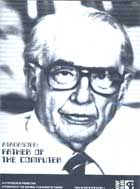
Atanasoff: Father of the Computer 2012
Distributed by National Film Board of Canada, 1123 Broadway, Suite 307, New York, NY 10010; 800-542-2164
Produced by Mila Aung-Thwin & Daniels Cross
Directed by Mila Aung-Thwin & Daniels Cross
DVD, 46 min., color, b&w
Sr. High - General Adult
Computer Industry, Biography, Law, Computer Science
Date Entered: 06/20/2014
Reviewed by Steve Bertolino, Reference and Instruction Librarian, Middlebury College, Middlebury, VTPurporting to be an investigation of the man who invented the first digital computer, a majority of this well-written and visually interesting film focuses on the patent law case which, in the early 1970s, recognized him for his achievement. Though there’s a degree of biography of Atanasoff, the documentary is limited because he passed away in 1995, and can only use recycled interviews with him. However, it makes use of these well, and builds its other interviews around them. Some of these are with other scientists from his cohort, and some with contemporary scientists, lawyers, and leaders in the computing world, and they do work together to create the complicated world of computer development in the 1940s as well as the litigation which took center stage in the 1960s and 70s.
The only drawback to the documentary is how much time it spends on the details of the patent law case, which is inherently less interesting than the personalities involved, and less germane to today’s audience than an exploration of how the landmark case affects our world today. This latter concern is addressed, but only in the last five minutes of the documentary, and is glossed over largely with the inclusion of soundbytes from some of today’s well-known computing giants. However, for a documentary which spends a majority of its time on law proceedings, the visuals in the film are top-notch, from a physical re-creation of Atanasoff’s original computer, to effects shots helping to explain the workings of early computers, to effective and professional staged moments of history, revisiting how Atanasoff came up with the idea for a non-mechanical computer, to illustrate testimony in depositions. The film also casts a wide net for its audience by using a minimum of computer and legal jargon, and does a good job of giving voice to both Atanasoff and the scientists on the other side of the legal dispute. I can see this documentary being of most use to introductory computer classes at the high school or college level, or to anyone interested in the history of computing.